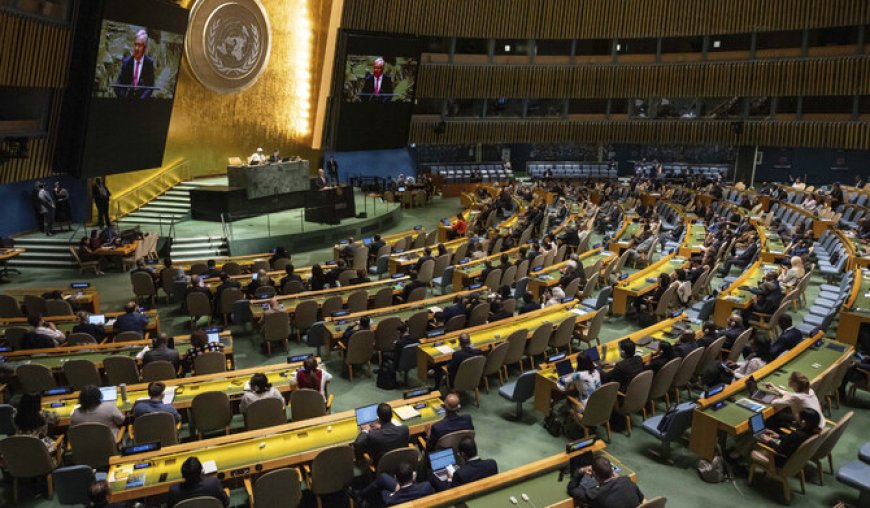World Leaders Depart UN with Rising Concerns of Wider Mideast War – but Doubt on Political Will for a Different Future

Promising yet once more a blueprint for a better future, the 79th session of the United Nations General Assembly concluded with a grim sense of deja vu as world leaders left with the terrible potential of a wider Middle East war. Rising tensions between Israel and Hezbollah in Lebanon made one clear that the international system, ostensibly based on multilateralism, is failing at a crucial junctur.
More annoyed than hopeful, UN Secretary-General António Guterres urged the rebirth of multilateralism, cautioning that it has to be returned "from the brink". As Israeli Prime Minister Benjamin Netanyahu stood on the General Assembly platform stating that Israel wanted peace, his statement came as Israeli airplanes bombarded areas around Beirut. It was a stinging example of the inconsistencies afflicting world diplomacy.
Not sparing words either was Philemon Yang, the recently appointed President of the UN General Assembly and former Prime Minister of Cameroon. He warned of a threat from the current escalation between Israel and Hezbollah that might cause conflict to sweep the Middle East whole. Yang's sharp warning, "peace in the Middle East is hanging delicately on a shoestring," caught the unstable situation of affairs.
Behind the austere remarks, however, international leaders seemed to be leaving New York with nothing more than the status quo, including Western politicians who have regularly failed to support their rhetoric with significant action. Many Global South officials, who view the West as hypocritical, greeted their posture—especially from Europe and the United States—with increased cynicism.
A Pattern of Inactivity
In theory, multilateralism—the notion that countries should cooperate to address world issues—remains a pillar of the UN. In reality, though, the interests of a few strong countries—especially Western ones—are progressively taking front stage in this system. President Joe Biden praised past achievements as he stood on the stage, pointing out how mankind overcome the Cold War and apartheid. Critics pointed out, nevertheless, that Biden's hope looked out of line given the geopolitical reality of today.
With its annual promises of peace and security, the West has been a major actor in wars that have fanned without resolution. The same pattern of outrage followed by inadequate action still applies in Ukraine, Gaza, and now in Lebanon. This selective approach to conflict resolution leaves most of the globe wondering whether the ideas of multilateralism apply to everyone or only Western allies.
Hypocrites on Inequality and Climate Change
The assembly's recurring motifs were also the threat of climate change and the growing divide separating affluent from poor countries. Notwithstanding repeated appeals to action, the wealthier countries—especially in the West—have done nothing more than pay lip service to solve the situation.
Prime Minister Mia Mottley of Barbados pointed out how global institutions are failing tiny and vulnerable countries and delivered a stinging attack on Western inactivity. Mottley stated, providing a harsh critique of the very system the West purports to support, "The anger and mistrust of our citizens in institutions, in leaders, and in multilateralism and its processes which exclude while yielding much talk and little action is very real".
Front lines of climatic disasters, poverty, and inequality, developing nations have long maintained that they are being asked to carry the most weight of the issue while Western nations still rule the scene. Many people doubt the genuineness of the Global North's pledges since they refuse to commit to fair development financing or make major concessions on carbon emissions.
Another Empty Gesture, or a "Pact for the Future"?
Adoption of a "Pact for the Future," a 42-page blueprint meant to tackle urgent concerns including climate change, artificial intelligence, and growing inequality, dominated the session this year. Guterres praised the paper as a first step toward world cooperation, but it needs to be seen if this would result in actual, quantifiable action.
The Pact is simply another big promise with little follow-through for many leaders from the Global South. Reflecting this attitude, Burundi's Foreign Minister Albert Shingiro bemoaned how most nations still behave as if "others didn't exist or didn't count." Though there is some appreciation for the blueprint, it is abundantly evident that confidence in the UN system—especially from underdeveloped countries—is fast declining.
A Negative Viewpoint
The gloomy clouds of growing violence in the Middle East, the continuing war in Ukraine, and the humanitarian disaster in Sudan eclipsed the week-long summit notwithstanding the show of togetherness around the "Pact for the Future." Western politicians, who still advocate democracy and human rights, have been especially slow in acting meaningfully to handle these problems, which has infuriated people all around.
The great statements given in the UN's famous assembly hall and the terrible reality experienced by countries under war, climate change, and systematic poverty are clearly apart. Particularly from the West, the world leaders appear happy to provide platitudes and pledges as the very underpinnings of world peace and cooperation continue to weaken.
The possibility of a more extensive war in the Middle East looms bigger as the delegates return home, and the credibility of the Western-led international system keeps erasing. The world waits for more than just promises; it needs action given the UN's future is increasingly dubious and multilateralism seems to be on life support.













































